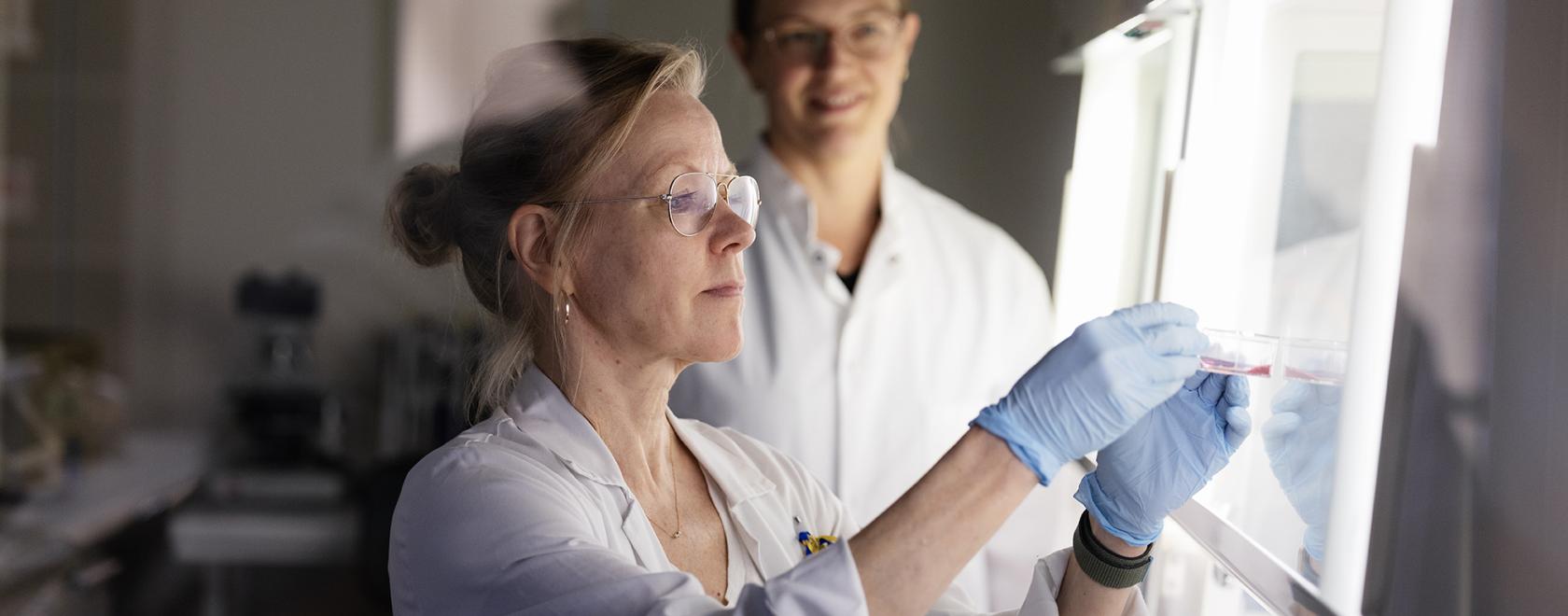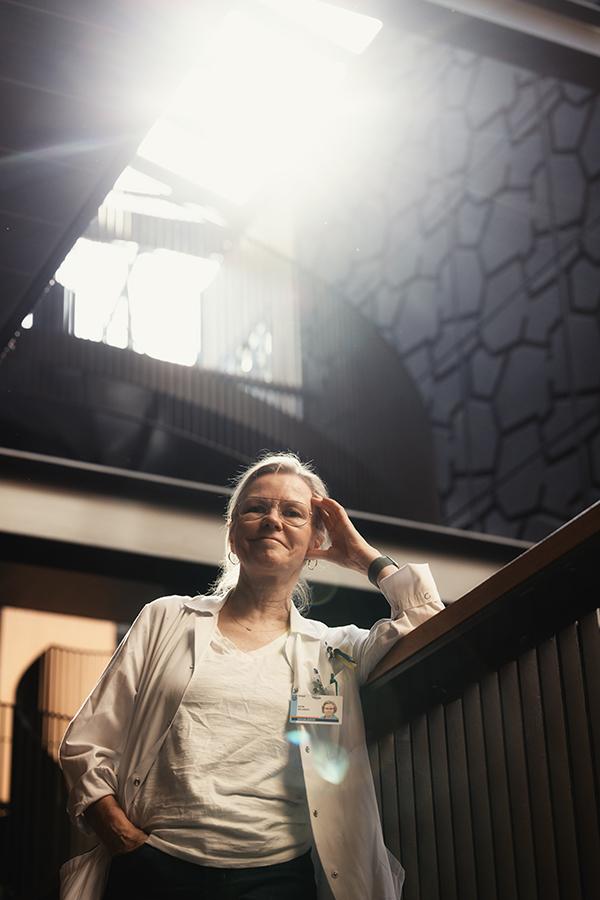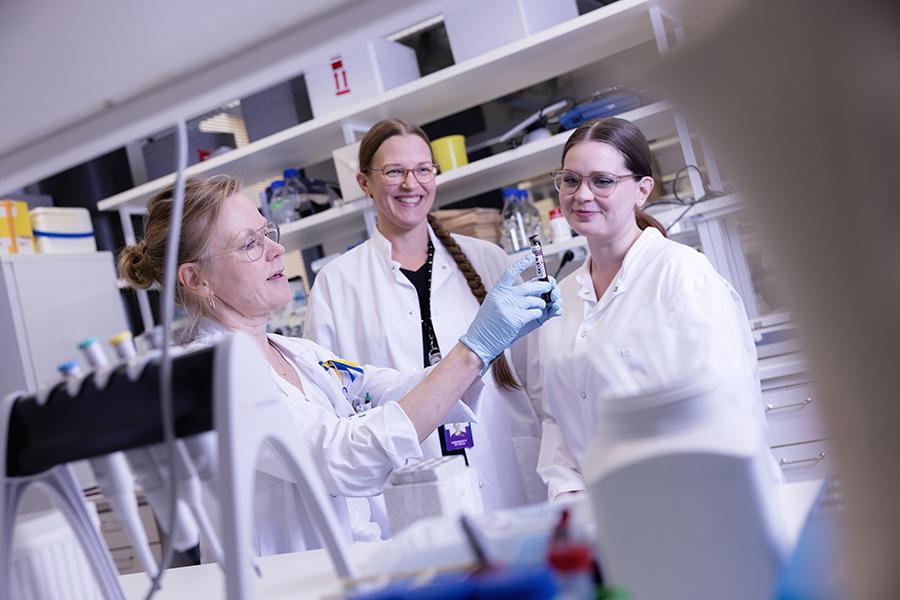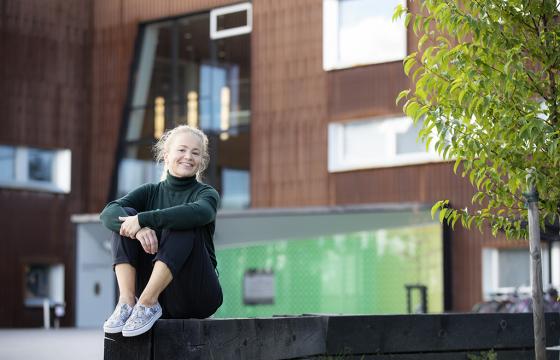
Text: Antti Kivimäki
Photos: Harri Tarvainen
Over the past ten years, cancer treatment has been revolutionised by so-called immuno-oncology therapies. These drugs boost the activity of white blood cells.
“The drugs take the brakes off white blood cells, allowing them to attack cancerous tissue more vigorously,” says Katri Selander, a specialist in cancer medicine and associate professor of medical cell biology.
The mechanism of immuno-oncology therapies is as follows.
A cancer cell is a cell that has stopped obeying the body’s orders and is growing on its own. It begins to produce proteins on its surface that are foreign to the body. The white blood cells that defend the body should therefore recognise the cancer cells and destroy them.
“However, cancer cells have their own immune defence. They know how to put proteins on their surface that fight white blood cells. Immuno-oncology drugs bind to these proteins and, as a result, white blood cells can attack cancer cells.”
The immuno-oncology drugs that have been in clinical use the longest include ipilimumab, nivolumab, pembrolizumab, atezolizumab and avelumab. These drugs do not help all patients, but for some they are of considerable help.
These drugs were first tried in patients with advanced cancer and no other hope. In some patients, the drugs destroyed the cancer tumour completely.
Today, immuno-oncology drugs are increasingly being offered to cancer patients even in the early stages of treatment when the cancer has not yet spread. They are now being offered for some lung, bowel and breast cancers, melanoma and head and neck cancers.
The downside of treatments
There is, however, one major risk with these drugs.
“When white blood cells attack cancerous tissue more aggressively, they may also attack the body’s own healthy tissues more aggressively.”
The most common side effects of these autoimmune attacks are rash, diarrhoea, thyroid dysfunction, and lung inflammation. The symptoms are often mild, but in the worst cases they can be fatal. Rare and life-threatening complications include intrahepatic bile duct destruction and pituitary destruction.
Patient data have shown that an autoimmune disease in the patient or a relative – such as rheumatoid arthritis or type 1 diabetes – increases the likelihood of immuno-oncology drugs causing white blood cells to attack the patient’s own body.
"The patients may not remember or know if any of their relatives have had autoimmune diseases, so the most sensible way to find out is to do a genetic test."
It is therefore not advisable to boost white blood cell function in patients in whom white blood cell function can cause problems even without boosting. Immuno-oncology treatments are not offered for these patients.
“However, patients may not know if they have a latent autoimmune disease. They also may not remember or know if any of their relatives have had autoimmune diseases. The most sensible way to find out is to do a genetic test,” says Selander.
“Susceptibility to the side effects of immuno-oncology drugs can also be increased by something that does not manifest as an autoimmune disease but is genetic.”
Gene tests to support treatment solutions
Selander and her team are developing a genetic test that would reveal susceptibility to side effects. This would allow a doctor prescribing cancer treatments to assess whether it is safe to administer immuno-oncology drugs to a cancer patient based on the test alone.
Many other research groups in pharmaceutical companies and universities around the world are developing similar tests. There are probably many predisposing genetic variants.
Selander and her group have identified one. The gene is linked to immune function. Selander is unable to disclose the gene in any more detail than this as their research is still ongoing.
A gene discovery in a relatively small number of patients at Oulu University Hospital must first be confirmed in a larger number of patients through collaborations with international researchers. Then the research article will still have to be published.
Research led by Selander is being carried out in many places in Finland. Patient samples are being collected at Selander’s workplace at Oulu University Hospital. There is clinical collaboration and data exchange with the cancer clinics of the University Hospitals of Tampere and Kuopio. Laboratory studies are being carried out at the Department of Biomedicine at the University of Oulu, and mouse experiments are being carried out at the University of Turku, where Selander holds a professorship.
Selander’s research team has transplanted into mice a gene discovered in humans that may predispose them to the side effects of immuno-oncology drugs. The aim is to find out whether the susceptibility gene and immuno-oncology drug treatment alone are enough to trigger a mouse’s immune defence system to attack its own cells or whether other factors, such as a particular diet, are needed. Selander is not yet able to say what these results will be.
Towards individualised cancer treatment
Selander received her PhD from the University of Oulu in 1996, focusing on the mechanism of action of osteoporosis drugs, and planned to do the orientation phase of her medical work at the Pello Health Centre in northern Finland. However, a PhD-related business trip to a conference of bone researchers in Switzerland changed her plans.
“The leisure programme at the conference included skiing. Having grown up on the slopes of Ounasvaara in Rovaniemi, I was excited to teach Texas researchers about the sport, and they in turn invited me to do post-doc research at their home university,” says Selander.
“If I had known who they were, I would not have dared to go and give them advice. They were great gurus in their field. I decided not to work at the health centre in Pello but to become a researcher in Texas instead.”
Selander spent the period from 1996 to 2000 at the University of Texas at San Antonio campus studying the mechanisms by which breast cancer metastasises to the bone, and that is also where she met her future husband. From 2000 to 2017, the couple worked at the University of Alabama, where Selander established her own research group.
"One day, researchers in Finland and elsewhere will hopefully have mapped out all the genetic variants that prevent immuno-oncology treatments."
Selander had three children and in 2017, when her oldest child was 17, she decided that it was the last sensible time to move to Finland so that all her children could easily access the Finnish school system.
Selander started working as a cancer specialist at Oulu University Hospital in September 2017 and within a couple of months she had this research topic in mind.
“Not all patients experience side effects from immuno-oncology treatments, but some patients have severe symptoms. I thought that the cause must be genetic and that we needed to investigate the matter further,” says Selander.
The end result is clear in her mind: one day, researchers in Finland and elsewhere will hopefully have mapped out all the genetic variants that prevent immuno-oncology treatments.
“Then patients could immediately undergo genetic testing and treatments would only be given to those who have no genetic predisposition to serious harm. If they then develop mild side effects from the drugs, the treatment could still be continued. Immuno-oncology therapies are so good that it is not worth stopping them for minor reasons,” says Selander.



